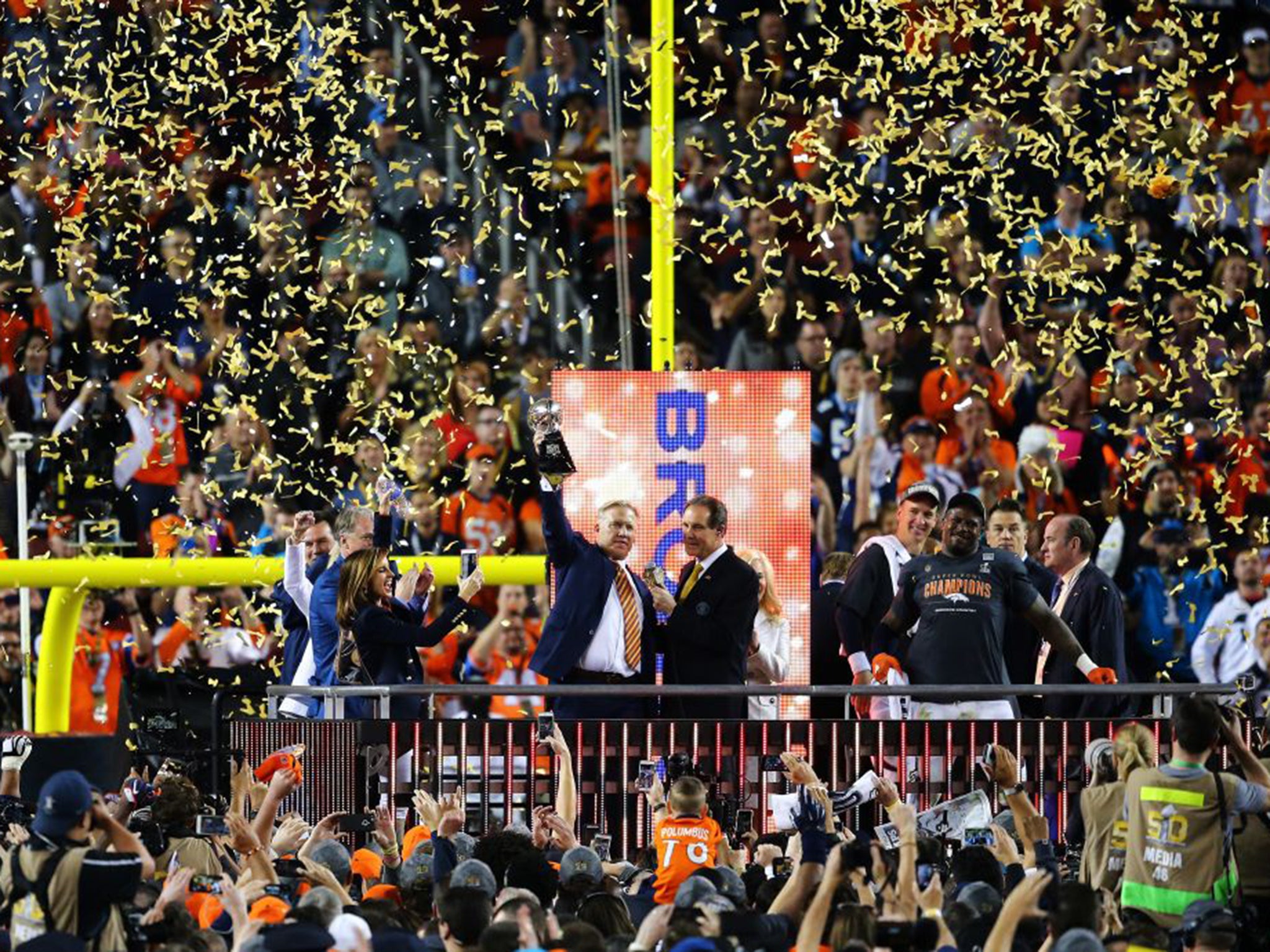Super Bowl 50: Brutal Denver Broncos turn back the clock to beat Carolina Panthers
Denver’s defensive masterclass proves too strong for Panthers and Newton

On Tuesday, in the shadow of the snow-capped Rockies, the Denver Broncos are holding their Super Bowl victory parade. And pride of place must go not to Peyton Manning, their ancient lion of a quarterback, but to the defense which obliterated the Carolina Panthers in general, and the brightest young talent in the game in particular.
The 50th edition of the showcase event of America’s richest and most popular sport had been billed as a generational showdown between Manning, 39 going on 40 and holder of five regular-season MVP awards, and Carolina’s Cam Newton, the brash and massively talented 26-year-old who, some say, is rewriting how the quarterback position is played.
Not so. This Super Bowl was a reversion to the past, an era before the modern pattern of turbo-charged offense, high scoring, and greater protection for players. Defense dominated. Unfortunately for the Panthers, they may have a very good one, but the Broncos have a better one – in fact, maybe the best ever.
In 2014, Denver were routed 43-8 by the Seattle Seahawks in one of the most embarrassing Super Bowl defeats ever. Cue a complete rebuilding, whose fruits are now visible to all. “We have the greatest defense to ever play this game,” bragged the Denver linebacker Brandon Marshall after Sunday’s battle of Santa Clara in California – and who’s to disagree?
The Broncos dismantled Newton as they had dismantled Manning’s old rival, Tom Brady of the New England Patriots, in the AFC title game last month. Six times they sacked Newton; on one of them, by Denver lineman Von Miller, the game’s MVP, he was forced into a fumble that the Broncos recovered and turned into their first touchdown. Another Miller semi-sack, again close to his own line, led to Denver’s second and decisive touchdown with three minutes left in the final quarter. A two-point conversion made the score 24-10, and that was that. Carolina’s near-perfect 15-1 regular season, in which he threw 45 touchdowns, had made Newton an inevitable MVP. On Sunday, though, he was reduced to impotence. Time and again, the Denver pass rush, violent and blisteringly fast, overwhelmed his offensive line. With all his receivers covered, there was nowhere for him to go.

It was the harshest roughing-up of his career – and, stunned and frustrated, the normally loquacious Newton admitted as much: “They just played better than us, I don’t know what you want me to say.” A few other monosyllabic replies to reporters, and he left the post-game press conference. There truly was nothing much more to say.
Newton, however, surely hasn’t played his last Super Bowl. This was a learning experience from which he should emerge stronger. For Manning however, although he wouldn’t confirm it (“I don’t know the answer to that,” he said afterwards when asked about retirement, “I’m not making the decision in the emotional heat of the moment”) this has to be his swansong.
His arm is close to going. He was sacked five times himself, and threw a paltry 13-23, for 141 yards. With that defense, it was enough to win the game, but not enough to make you forget Manning’s wretched and injury-scarred regular season, in which he was benched for the first time in his 18 years in the National Football League. In Brock Osweiler, who replaced him for half a dozen games, Denver seem to have a successor in place.
Now Manning has the chance – taken by so few marquee athletes in any sport – to bow out a winner on the biggest stage of all, with a second championship ring and his reputation safe as one of the greatest quarterbacks ever to grace the game. In doing so, he would follow the Broncos’ in-house legend, general manager John Elway, who after winning a second consecutive Super Bowl for the team in January 1999, announced that that was it.
Even so, this cannot have been the season finale the NFL wanted. Denver’s defensive masterclass was one for the ages. But it was a stark reminder of the brutal essence of the game, when concern about the risks of permanent brain damage to players has never been greater.
This was no thrilling quarterback duel, of relentless drives, laser passes and balletic catches. It was a take-no-prisoners battle of grit and blood, of crunching hits, unconverted third downs and countless punts, with only two offensive touchdowns. Denver’s strategy, the defensive back Aqib Talib said, was “to hit them early and let them boys know what kind of game it was going to be”.
The Broncos executed that strategy to perfection. Now comes the off-season, lasting until the 2016 NFL draft, starting on 28 April. In 1998 Manning was first overall pick, in 2011 it was Newton. This year another future superstar may emerge. But behind the glitz and the razzmatazz, gridiron’s problems remain.
Join our commenting forum
Join thought-provoking conversations, follow other Independent readers and see their replies
Comments
Bookmark popover
Removed from bookmarks